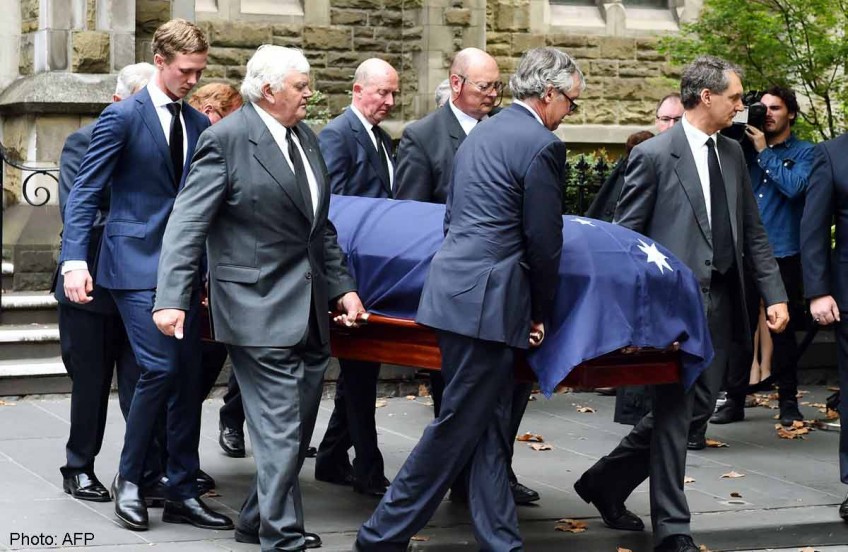Australia bids farewell to ex-PM Malcolm Fraser at state funeral

MELBOURNE - Hundreds of mourners gathered Friday at a state funeral for former conservative prime minister Malcolm Fraser, who came to power in 1975 with Australia's greatest constitutional crisis and died last week aged 84.
Prime Minister Tony Abbott attended the ceremony at Melbourne's Scots' Church along with former prime ministers Julia Gillard, John Howard and Paul Keating.
Fraser's close friend and a minister in his government, Peter Nixon, said the nation had lost a "unique and great Australian".
"From the start, it was apparent to me that Malcolm was sure to succeed," said Nixon, who started working with Fraser from 1961, told the approximately 700 people at the church. The ceremony was also televised live across the country.
"His contributions were always thoughtful."
Fraser died last Friday after a short illness, just five months after the death of Gough Whitlam, the man he dramatically replaced after the Labor leader became Australia's only prime minister to be sacked.
He began his term as the country's 22nd prime minister after the representative of Britain's Queen Elizabeth II, Sir John Kerr, dismissed Whitlam's government in November 1975.
Fraser was appointed caretaker and despite questions about the legitimacy of the dismissal, the Liberal Party man went on to win three elections, serving until 1983 with polices aimed at reducing spending and imposing responsible fiscal management.
Fraser's son Hugh told mourners his father loved Australia and was one of its "most fervent custodians".
"There were no days in his life where he woke and ceased to care about current affairs," he added.
"His sense of responsibility endured to the end."
'Very deep loss'
Fraser was also a strong supporter of human rights who oversaw an upsurge in immigration from Asia and a conservationist who banned whaling in Australia, while helping shape diplomatic and trade relations with East and Southeast Asia before being succeeded by Labor's Bob Hawke.
A staunch opponent of apartheid, Fraser was also noted for his strong support of reform in South Africa and for playing a prominent part in Commonwealth efforts to establish an independent Zimbabwe.
He formed aid group CARE Australia, established the Australian Federal Police, enacted the nation's first Freedom of Information laws and welcomed tens of thousands of Vietnamese boatpeople into the country.
Outside the church, dozens of supporters from the Vietnamese community praised Fraser for accepting them as refugees.
"We call him our father and our saviour," Phong Nguyen told the Australian Associated Press.
"He means everything to us but mostly freedom for saving us from the refugee camp. It's a very deep loss for our community."
Fraser maintained a high-profile after leaving office, lobbying for Australia to have a permanent seat on the UN Security Council and serving on Commonwealth observer groups overseeing elections in Pakistan, Tanzania and Bangladesh.
More recently, he became an outspoken critic of the Liberal party, taking a stand on indigenous issues, refugees and the war on Iraq.
Abbott, from the Liberal party, said last week that despite often disagreeing with Fraser's opinions, he "appreciated his insights and the wisdom born of long experience".
"Although his politics had changed over the years, he had led us triumphantly into government and deserved the continuing respect of all Australian Liberals," Abbott said.
Born into a wealthy family, Fraser was an Oxford graduate who entered parliament in 1955 and spent 10 years as a backbencher in the government of Robert Menzies.
A private burial followed the state funeral. Fraser left behind wife Tamie and four children..